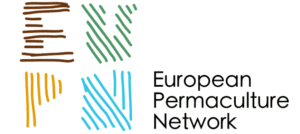Vous trouverez en lien le bulletin d’information Réseau Européen de Permaculture
et à suivre les objectifs du Réseau Européen de Permaculture.
La prochaine Convergence Européenne aura lieu en Irlande du 9 au 13 septembre 2018.
Vision, Mission and Aims of the European Permaculture Network (EuPN)
Vision:
We envision a diverse and vibrant Europe grounded in the ethics of permaculture
Mission:
We actively support the transition to an ethical and resilient Europe through nurturing an effective permaculture network with strong connections to the wider society and the world.
Aims & Objectives
I. Networking & Capacity Building – Network
EuPN reinforces and supports the establishment of, and collaboration between, European permaculture organisations and builds bridges with like-minded organisations and networks all across Europe and beyond.
Objectives:
- Starting points are to find two contact persons per national or regional organisation that wants to be part of EuPN.
- These people can then form and populate thematic working groups within EuPN. Some of these already exist and can be built on (especially around „Education“: European Permaculture Teachers’ Network, Children and Permaculture working group, Permaculture College of Europe, LAND Networks, etc.), others can be established according to needs and interests (e.g. „Design“, „Social Permaculture“, etc.).
- The European Permaculture Convergences are an already existing support structure for exchange and will be organised from within EuPN for its support.
- More long term, EuPN creates lists of organisations to link with on a European level and another one of key individuals in the public and private sector. Also, regional and macro regional networks will be supported in strengthening their connections.
- If needed, a possible future step is to create a legal entity. Until a legal entity is established, existing organisations with official legal status can be used to secure funding.
II. Communication & Image – Great communications & awareness of permaculture
EuPN sets up structures and support both for internal and external communication. It develops, implements and promotes a communication and image strategy.
Objectives:
- to create a communications platform so that we can easily communicate with each other
- to offer a contact point for organisations interested in EuPN,
- to promote & coordinate the mailinglist of the European Permaculture Network,
- to create a website with up-to-date information about the network (using existing content on permaculturecouncil.eu, plus history, mapping of organisations, calendar of events, links to members,…),
- to transform the newsletter of the European Teachers’ Partnership (EPT) into a newsletter which covers all topics of EuPN,
- to be represented in the „Permaculture Magazine“ with a specific heading „EuPN News“,
- to create a logo and brand manual including „standard applications“ (leaflets, cards, booklets,…), to develop a social media strategy and to build a database of relevant contacts.
III. Linking Research & Practice – Practice and research well linked
EuPN nurtures links between permaculture practitioners and researchers. It fosters research skills within the permaculture network and ensures that research findings strengthen permaculture education and practice and influence policy.
Objectives:
- The first steps to move this forward will be to form an European cluster of the Permaculture International Research Network (PIRN, currently facilitated by the Permaculture Association). This includes identifying practitioners for documenting and using scientific methods to analyse and learn from their practice and to communicate it.
- Once these structures are in place, EuPN promotes research approaches and skills, for example by spreading the Research Handbook, and identify supportive European research networks and institutions.
IV. Application & Outreach – Thriving outreach activities
EuPN supports organisations to empower citizens in the design of sustainable lifestyles based on the permaculture ethics and principles as the basic foundation for peaceful and inclusive societies. For this, it promotes permaculture tools and solutions in order to tackle conflicts & natural / human-made disasters, to provide sustainable relief response and support communities to become independent of humanitarian aid.
Objectives:
- EuPN will identify and collaborate with permaculturists in Europe and worldwide that work on disaster and relief response and that use permaculture tools for social processes. EuPN creates links with experts in this area.
- In the long run, EuPN offers a platform and network for support in peace work as well as disaster and relief response and offers permaculture training to peace / inclusion / disaster relief workers.
V. Connections to Policy levels – Excellent policy connections
EuPN contributes its local, national and macro regional expertise to European and wider policy levels, including work on the UN Sustainable Development Goals. It supports decision makers and stakeholders to move European society forward on a resilient path.
Objectives:
- Right away, EuPN builds on the connections that many European permaculture organisations create with ECOLISE. This “network of networks” helps to identify the unique and distinct contributions of permaculture to European societies’ needs and to points out leverage points and key topics where expertise is needed (e.g. agriculture, transport, housing,…).
- More long term, EuPN will find more partners and networks that have extra-expertise on specific topics to move key issues forward. Permaculture research findings will be used for policy briefings and communications with national and European agencies and other NGOs.
VI. Scaling up – Increasing permacultural capacity
The EuPN develops strategies for resource mobilisation to scale up permaculture projects.
Objectives:
- For this, EuPN will develop a funding and resource mobilisation policy based on the permaculture ethics. It identifies existing resources within the network and in the supportive environment, as well active fundraisers and national public and / or private funding sources.
- In the long run, it brings together skills and information and provides a coordinating platform for project partnerships and the visibility of funded projects. This will include:
- increasing the quality of permaculture activities,
- increasing the scale of permaculture projects & initiatives,
- modeling accelerated succession for each country to scale up from where it is now.


Commentaires récents